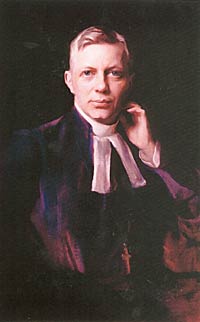Readings:
Psalm 46:4-11
Amos 7:10-15
Revelation 11:15-18
Mark 13:1-13Preface of Holy Week
[Common of a Pastor]
[For the Ministry II]
[For the Unity of the Church]
PRAYER (traditional language)
God of peace, who didst sustain thy bishop George Bell with the courage to proclaim thy truth and justice in the face of disapproval in his own nation: As he taught that we, along with our enemies, are all children of God, may we stand with Christ in his hour of grieving, that at length we may enter thy country where there is no sorrow nor sighing, but fullness of joy in thee; through Jesus Christ our Redeemer, who with thee and the Holy Spirit livest and reignest, one God, in glory everlasting. Amen.
PRAYER (contemporary language)
God of peace, you sustained your bishop George Bell with the courage to proclaim your truth and justice in the face of disapproval in his own nation: As he taught that we, along with our enemies, are all children of God, may we stand with Christ in his hour of grieving, that at length we may enter your country where there is no sorrow nor sighing, but fullness of joy in you; through Jesus Christ our Redeemer, who with you and the Holy Spirit lives and reigns, one God, in glory everlasting. Amen.
This commemoration was approved provisionally at General Convention 2009.
Return to Lectionary Home Page
Webmaster: Charles Wohlers
Last updated: 5 August 2017
GEORGE BELL
BISHOP OF CHICHESTER, AND ECUMENIST,
3 October 1958
 George
Kennedy Allen Bell (4 February 1883
- 3 October 1958) was an Anglican theologian,
Dean of Canterbury, Bishop of Chichester, member of the House of Lords
and a pioneer of the Ecumenical Movement.
George
Kennedy Allen Bell (4 February 1883
- 3 October 1958) was an Anglican theologian,
Dean of Canterbury, Bishop of Chichester, member of the House of Lords
and a pioneer of the Ecumenical Movement.
After WW I, Bell became an outstanding initiator and promoter of the still-young ecumenical movement. In 1919, at the first postwar meeting of the World Council of Churches in the Netherlands, he successfully encouraged the establishment of a commission for religious and national minorities. At the world churches conference in Stockholm in 1925, he helped in the realization of the "ecumenical advice for practical Christianity (Life and Work)".
In 1929 Bell was appointed Bishop of Chichester. In this role he organised links between his diocese and of workers affected by the Great Depression.
After 1933, Bell became the most important international ally of the Confessing Church in Germany. In April 1933 he publicly expressed the international church's worries over the beginnings of the Nazis' antisemitic campaign in Germany. ... On 1 June 1934 he signed the Barmen Declaration, the foundational manifesto of the Confessing Church - it proclaimed that Christian belief and National Socialism were incompatibile and declaimed the pro-Nazi German Christians as "false teaching".
During World War II Bell repeatedly condemned the Allied practice of area bombing. As a member of the House of Lords, he was a consistent parliamentary critic of area bombing. ... Bell was also one of the first British bishops to protest against the inhumane treatment of approximately 14 million Silesian, Pomeranian, East Prussian and Sudeten Germans expelled from their homes in East Germany. ... In the 1950s Bell opposed the atomic arms race and supported many Christian initiatives of the time opposed to the Cold War.
In 1995, 37 years after Bell's death, a complaint was made to the then Bishop of Chichester, Eric Kemp, alleging that Bell had abused a child during the 1940s and 1950s. The complaint was not passed on to police until a second complaint was made to the office of Justin Welby, the Archbishop of Canterbury, in 2013. The investigation is ongoing.
(more from Wikipedia)